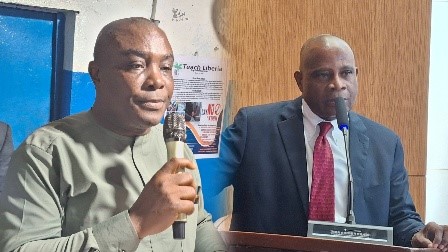Sinoe County’s two senators, Augustine Chea and Crayton Duncan, have jointly sounded the alarm over what they described as the “deteriorating state of education, labour, and infrastructure” in the county — calling on the central government to urgently address the worsening conditions that continue to hinder local development.
Speaking separately during recent legislative deliberations, the lawmakers expressed deep concern over poor school facilities, impassable roads, neglected public buildings, and government inaction on environmental issues, all of which they say are strangling progress in one of Liberia’s oldest southeastern counties.
Senator Augustine Chea lamented the deplorable state of education in Sinoe County, noting that many students are unable to attend school due to poor road connectivity and a lack of essential learning materials.
“There are students who are down in school in Sinoe right now because there’s no road to where their school building is,” Chea said. “Education is not a privilege — it’s a right. We must ensure that our children have access to learning facilities, teachers, and the necessary support.”
The Sinoe lawmaker criticized what he called “budgetary neglect,” arguing that the Ministry of Education and related agencies have failed to prioritize the needs of rural counties. He vowed not to support any national budget that does not allocate tangible resources to address the plight of Sinoe residents.
“I will not vote for any budget that fails to provide support for the needs of the people of Sinoe — our roads, our city infrastructure, and our schools,” he declared.
Chea further decried the dilapidated condition of public buildings in the county, including the Greenville Administrative Building and other district offices, which he said have been “abandoned and left to decay.”
“You go to Sinoe today — the largest public building, once a beautiful administrative complex, is now in ruins. This level of neglect is unacceptable,” he added.
Meanwhile, Senator Crayton Duncan echoed his colleague’s frustrations but focused his remarks on what he termed “executive negligence” leading to environmental degradation and labour exploitation in the county.
Duncan accused the government of turning a blind eye to illegal mining and pollution caused by both local and foreign operators, resulting in contaminated water sources across Sinoe.
“When I brought the issue of water pollution to the Senate floor, the EPA director admitted they didn’t have money in the budget to investigate,” Duncan recounted. “Now, our waters are more polluted than before. Our people are drinking poison while the government looks away.”
The senator also questioned the relevance of lawmakers’ presence at the Capitol if they cannot compel the executive branch to act in the interest of their constituents.
“Why do we come here — to just sit, talk, and watch the executive neglect our people?” he asked. “We must rise above party loyalty and hold the government accountable for the suffering of our citizens.”
Both senators agreed that the challenges facing Sinoe County — from failing schools and crumbling infrastructure to environmental degradation — require immediate and coordinated intervention from the central government. They emphasized the need for transparent budgeting, equitable resource allocation, and stronger collaboration between national and local authorities.
“The people of Sinoe deserve better,” Chea concluded. “We cannot continue to talk development while our roads are impassable, our schools are empty, and our public buildings are falling apart.”

